 Three UK universities namely, University of Central Lancashire (Uclan), De Montfort University, and Nottingham Trent University, have been placed on “action plans” by the UK Home Office due to breaches in their student visa sponsorship compliance. These action plans are implemented when universities fall short of serious violations but need corrective measures to improve their processes.
Three UK universities namely, University of Central Lancashire (Uclan), De Montfort University, and Nottingham Trent University, have been placed on “action plans” by the UK Home Office due to breaches in their student visa sponsorship compliance. These action plans are implemented when universities fall short of serious violations but need corrective measures to improve their processes.
The Home Office’s action plans help institutions avoid more serious consequences, such as the revocation of their sponsorship licenses. These licenses are vital for enrolling international students. The specific reasons behind these actions have not been disclosed, but universities usually undergo assessments that look at factors like visa refusal rates, student enrollment, and course completion rates. Universities placed on action plans are required to pay a fee and usually have three to six months to address the issues.
The news is particularly concerning for large universities, as only one other institution, Oxford International College Brighton, is currently subject to an action plan among hundreds of UK institutions listed as student visa sponsors. This development highlights the financial reliance many universities now have on international student fees amidst a wider funding struggle in higher education.
De Montfort University has expressed confidence in meeting the UK Visas and Immigration (UKVI) standards. Nottingham Trent University referred to the action plan as part of a routine audit, while Uclan has not yet commented.
A spokesperson from the Home Office emphasized the department’s commitment to upholding high standards and preventing abuse of the immigration system. The UK has only had two universities lose their sponsorship licenses in recent years—London Metropolitan University in 2012 and Birmingham Newman University in 2018—both of which have since regained their licenses.
Note once again the key point that 3 UK universities—Uclan, De Montfort University, and Nottingham Trent University—are currently under action plans by the UK Home Office for failing to meet visa sponsorship compliance standards. These action plans aim to address breaches without revoking sponsorship licenses, which are crucial for enrolling international students. The move highlights the growing reliance of UK universities on international student revenues amid financial challenges in higher education. While the universities involved are working to meet the required standards, this development underscores the importance of maintaining strict compliance with immigration rules to avoid serious consequences.
As UK universities face mounting financial pressure, ensuring compliance with visa sponsorship regulations is expected to remain a priority




